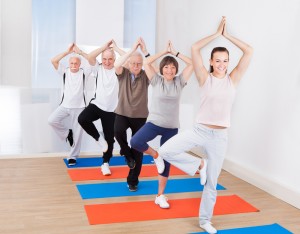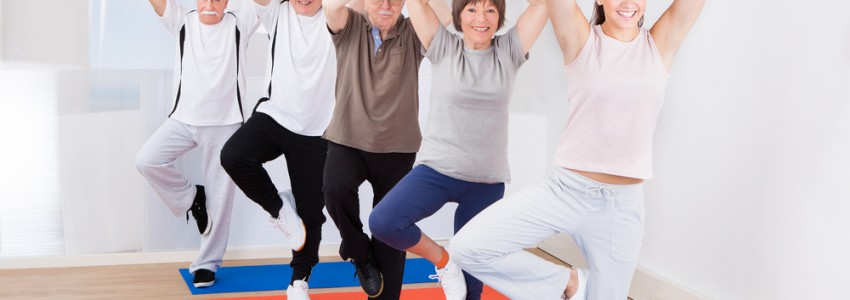I recently ran a Facebook advert to encourage people to join my rehab exercise groups. It was very successful with over 50 applicants, with many already coming in to their first free class to experience the Merlin Fitness magic, and then going on to become regular members. Our pulmonary rehab, cardiac rehab, cancer rehab, yoga, pilates and 55+ classes are all thriving and continuing to grow.

As part of the application process I ask potential clients to tell me little bit about themselves, their fitness background and any medical conditions, and a number of people wrote something to the effect of “I am overweight and lazy and hate exercise”.
Much as I admired their honesty, I was slightly taken aback, and the responses made me think more deeply about what people imagine when they envisage exercise. I’m guessing it is hot, sweaty, aerobics type class where everyone is expected to do the same thing whilst facing an overexcited, lycra clad, super-fit instructor. Whereas this traditional type of class can be incredibly effective, it can become less approachable as we get older, acquire injuries or longer term medical conditions. That being the case, is it any surprise that people decide before even trying it that group exercise isn’t for them?
Personally I also wondered how anyone could say that they hate exercise. Many years ago when I took my Exercise on Referral qualification, I remember being told that we should call it physical activity rather than exercise, as this would be less intimidating to a potential client. Honestly, I don’t mind what you call it, as long as you make a commitment to yourself to at least do some form of activity on most days!
Health and exercise guidelines
Think further and it becomes apparent that the term ‘exercise’ in fact encompasses any form of movement which raises a heart rate above its resting level for at least a few minutes at a time. The government physical activity guidelines for adults aged 19-64 state that:
1. Adults should aim to be active daily. Over a week, activity should add up to at least 150 minutes (2½ hours) of moderate intensity activity in bouts of 10 minutes or more – one way to approach this is to do 30 minutes on at least 5 days a week.
2. Alternatively, comparable benefits can be achieved through 75 minutes of vigorous intensity activity spread across the week or combinations of moderate and vigorous intensity activity.
3. Adults should also undertake physical activity to improve muscle strength on at least two days a week.
4. All adults should minimise the amount of time spent being sedentary (sitting) for extended periods.
For older adults aged 65+, the guidelines are surprisingly similar, with a reminder that those that participate in “any amount of physical activity gain some health benefits, including maintenance of good physical and cognitive function. Some physical activity is better than none, and more physical activity provides greater health benefits.” Additionally, “Older adults at risk of falls should incorporate physical activity to improve balance and co ordination on at least two days a week.”
Whereas it is still down to the individual to decide exactly how to best follow that advice, this certainly goes some way to making it seem more achievable and less intimidating. Regular exercise has so many benefits, from reducing the risk of acquiring many health conditions (heart disease, stroke, type 2 diabetes etc.), maintaining a healthy weight, ability to keep your independence and perform daily activities with ease, improving self-esteem and reducing the symptoms of depression and anxiety.
Consequences of not taking regular exercise
For me, exercise is one of the most amazing, empowering, life-enhancing things we can do, as without the ability to move ourselves with at least some level of intensity on a regular basis, life can become very restricted.
“Those who think they have not time for bodily exercise will sooner or later have to find time for illness.” ~ Edward Stanley
Picture if you will the limitations which you would face if you (for whatever reason) became unable to leave your bed or your room. Maybe you have already been there, and it isn’t a great feeling, especially when it goes on longer term. You would become dependent on others, unable to easily socialise or interact with the world, and extremely limited in your choices. Very few people would voluntarily subscribe to that restricted a life. Of course for some people through misfortune and no fault of their own, it becomes a reality, but for others it is a sad consequence of lifestyle choices, inactivity, illness and disease.
We have to face up to whatever challenges life throws us, but I for one will do anything I can to keep my independence and ability to live the life I want to. With increasing age, we naturally have to modify our expectations of ourselves, and it is almost inevitable that we have niggles or pain, or medical concerns which colour the daily choices which we make.
That said, if we are prepared to fight for it, we shouldn’t by default be forced into a world of reduced quality of life and failing independence. Being totally reliant on others is one of the biggest fears often articulated by the elderly and infirm. Although I may be only be middle-aged, these are thoughts which have already started passing through my mind, and one of the main reasons I am so passionate about helping others who want to do their best to look after their mental and physical health as they get older.
Why I chose to exercise
There is always a natural assumption that having spent much of my life either as an athlete and personal trainer, I must love exercise. I suppose I do, but these days it is as much about looking after my body so it is capable of allowing me to pursue the other activities I want to, rather than a superficial competitive goal. I choose to exercise because I like the way it makes me feel, and the confidence and belief it gives me in so many of the other aspects of my life.
If you told me that I could simply take a pill to give me all the purported benefits of exercise, whilst at the same time staving off all illness and disease, I would still want to do the activities which I enjoy such as cycling, sailing and walking. Nothing would make me want to stay on the couch, watching television and feeling my life figuratively and literally slipping away. So I exercise so I can make the most of life experiences and build memories to carry me through.
What regular exercise brings us is the opportunity to move and make the most of the world around us and the people in it. So yes, I do understand why somebody might say that they hate exercise, but I can simply ask that we re-frame that statement. What activities bring you the most happiness and joy? What does leading a fulfilling life mean to you? Do you want to be able to grab every opportunity to interact with the world around you whilst enhancing the life of others? Do you want to live as long as you can in good health, whilst accepting that not all your life choices have been perfect, and knowledge that you are now doing your best to preserve what is left?
Regular and moderate levels of exercise are not the panacea for all of our health problems, but it can certainly go a long way towards us all taking personal responsibility for the choices which we make. Especially for those of you who already have limiting medical conditions, exercise can allow you to rebuild ability, possibility and confidence. It doesn’t have to be hot, sweaty, unpleasant, embarrassing or awkward. In the right format, it can be fun, sociable, nurturing to spirit and unbelievably good for us both physically and mentally.
Don’t just say that you ‘hate exercise’. Find some form of activity which you can enjoy on a reasonably regular basis, and things which make you feel passionate and alive. Get out of the house, walk, swim, dance, play, jump up and down, hug a friend, throw a ball, stroll on the beach. Look after your body, so it can in turn look after you!






